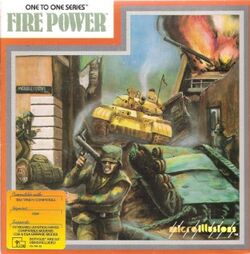Software:Fire Power (video game)
| Fire Power | |
|---|---|
 | |
| Developer(s) | Silent Software |
| Publisher(s) | MicroIllusions |
| Designer(s) | Baron R. K. Von Wolfsheild |
| Platform(s) | Amiga, Apple IIGS, MS-DOS, Commodore 64 |
| Release | 1987, 1988 |
| Genre(s) | Action |
| Mode(s) | Single, multiplayer |
Fire Power (also Firepower) is a military tank action game developed by Silent Software for the Amiga. It was released in 1987 and published by MicroIllusions and Activision. Ports were released for the Apple IIGS, the Commodore 64[1] and for MS-DOS in 1988. An Atari Lynx version was planned but development never started due to internal conflict with Epyx.[2]
Summary
The gameplay consists of controlling a tank through an expansive, outdoor landscape. Each map has at least two bases - one for the green team, and one for the yellow (red in the PC version) team. Initially, the base locations were hidden from the players, so an extensive search of the landscape had to be conducted first. Nonetheless, many players chose to rampage around the map, simply blasting away. Obstacles included enemy turrets spread around the map, various fortifications and destructible buildings. If the player stood still for too long (to set up an ambush, for instance), a series of enemy helicopters would appear from off screen and attack. The helicopters could be shot down with the tank's main weapon.
Bases and tanks
Each base has several different types of buildings, such as armories, barracks, and bio-domes. The objective is to capture the flag from inside the enemy base by blasting through walls and destroying any defenses. You could also rescue prisoners of war by destroying the POW camps that were scattered throughout the enemy base. Destroying the camps would allow the captives to hop in your tank for a ride back to your base. An extra tank life is rewarded for each fifteen POWs rescued.[3]
Three different tanks are available: one is fast and fragile, one is slow but strong, and the third is rated in between the two. Each tank could carry a different amount of POWs. To capture the enemy flag, you had to carefully maneuver your tank into the flag building and drive over the enemy flag to pick it up. Your weapons could not destroy garages.
Features
The game includes the ability to run over enemy soldiers, crushing them with an accompanying "squish" sound effect and a bloody "splat" that remains on the battlefield for several minutes. A map editor allows creation of custom multiplayer experiences.
Fire Power can be played alone, against a human opponent on a split screen, or over a modem, which allowed players to chat with each other while playing.
Reception
Roy Wagner reviewed the game for Computer Gaming World, and stated that "I find Fire Power to be a fair priced design with exceptional presentation. In other words, it is a great shoot 'em up arcade wargame."[4]
Reviews
- Computer and Video Games (Jun, 1988)[5]
- ACE (Advanced Computer Entertainment) (Oct, 1989)[6]
- ACE (Advanced Computer Entertainment) (Jul, 1988)[7]
- Info (Nov, 1987)[8]
- The Games Machine (Jun, 1988)[9]
- Commodore User (Jun, 1988)[10]
- Games-X (Aug 08, 1991)[11]
- Commodore Format (Jun, 1991)[12]
- ST/Amiga Format (Jul, 1988)[13]
- Commodore User (Oct, 1989)[14]
- The Games Machine (Nov, 1989)[15]
- Australian Commodore and Amiga Review (Apr, 1990)[16]
- Your Amiga (Jun, 1988)[17]
Legacy
Fire Power spawned two sequels, Return Fire and Return Fire 2.
References
- ↑ "Chronology of the Commodore 64 Computer (1988)". http://pctimeline.info/c64/c641988.htm.
- ↑ Ash (May 14, 2015). "Reichart Von Wolfshield - 3DO, Return Fire and the Video Game Industry: Interview". https://retrogamingblog.co.uk/2015/05/14/reichart-von-wolfsheild-3do-return-fire-and-the-industry/. Retrieved 2019-04-21.
- ↑ Screenshot at MobyGames.com showing pre-game instructions: "Lives: Each game starts with five tank lives. One additional life is added each time fifteen men are rescued (unloaded at a friendly first-aid station.)"
- ↑ Wagner, Roy (December 1987). "Fire Power". Computer Gaming World 1 (42): 51.
- ↑ "CVG Magazine Issue 080". June 1988. https://archive.org/details/cvg-magazine-080/page/n41/mode/2up.
- ↑ "ACE Magazine Issue 25". October 1989. https://archive.org/details/ace-magazine-25/page/n81/mode/2up.
- ↑ "ACE Magazine Issue 10". July 1988. https://archive.org/details/ace-magazine-10/page/n54/mode/2up.
- ↑ "Fire Power review from Info 17 (Nov - Dec 1987) - Amiga Magazine Rack". http://amr.abime.net/review_7027.
- ↑ "The Games Machine Magazine Issue 07". https://archive.org/details/thegamesmachine-magazine-07/page/n65/mode/2up.
- ↑ "Amiga Reviews: Firepower". https://amigareviews.leveluphost.com/firepowe.htm#firepowercu.
- ↑ "Games X Magazine 016". https://archive.org/details/Games_X_Magazine_016/page/n10/mode/2up.
- ↑ https://archive.org/stream/commodore-format-magazine-09/Commodore_Format_Issue_09_1991_06#page/n57/mode/2up
- ↑ https://archive.org/stream/ST_Amiga_Format_Issue_01_1988-07_Future_Publishing_GB#page/n53/mode/2up
- ↑ "Commodore User Magazine Issue 73". October 1989. https://archive.org/details/commodore-user-magazine-73/page/n61/mode/2up.
- ↑ "The Games Machine Issue 24". https://archive.org/details/the-games-machine-24/page/n82/mode/2up.
- ↑ "Australian Commodore and Amiga Review, the - Volume 7 Issue 4 (1990-04)(Saturday Magazine)(AU)". April 1990. https://archive.org/details/Australian_Commodore_and_Amiga_Review_The_Volume_7_Issue_4_1990-04_Saturday_Magazine_AU/page/n69/mode/2up.
- ↑ "Firepower review from Your Amiga (Jun - Jul 1988) - Amiga Magazine Rack". http://amr.abime.net/review_4909.
External links
- Firepower at Lemon 64
- Firepower at Lemon Amiga
- Fire Power at MobyGames
 |

